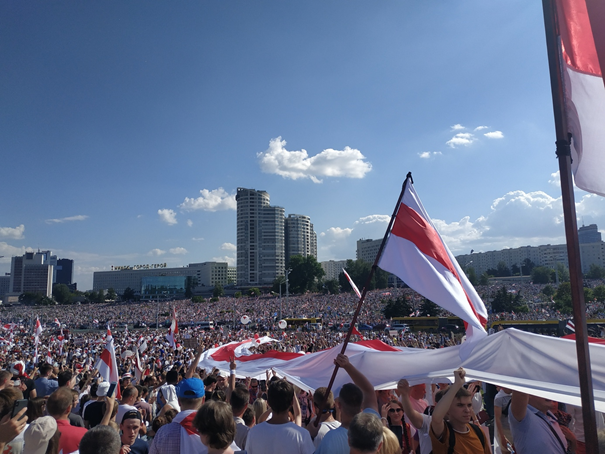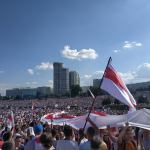BELARUSALERT – DAY 20 & 21
Date: 31 August 2020
Belarusian army maneuvers, Putin is playing the West | The regime gags the media, Women’s Marches all over the country

The regime continues its policy of gradually intensifying repressions. On the 20th day of the protests there were several dozen administrative trials across the country, in which fines and arrests of detained demonstrators were imposed. Throughout the day, several small protests took place in different parts of Minsk. The militia started to detain participants – only men, in the evening. On Friday, August 28, “complex tactical maneuvers” began in the Grodno region. As announced by the Ministry of Defense, the combined group of troops carrying out their training objectives included: mechanized, armored and airborne troops in addition to artillery, engineering units, drones and electronic combat units. The maneuvers were organized after Lukashenko ordered the strengthening of the military forces in the western part of the country, at the border with Poland, justifying it with an alleged threat from NATO countries. On Friday, Lukashenko argued that there is a risk of military aggression from the West, in which case Belarus and Russia would use a joint group of troops. Furthermore, the Belarusian leader announced that he would respond to possible sanctions from Western countries. He warned that his country would be closed to transit from the EU to China and Russia. Moreover, he declared that Belarus would redirect its goods being shipped through Lithuanian ports to other destinations (Moscow has long wanted Belarusians to export through Russian ports). This would hit mainly the Lithuanian Port of Klaipėda. Annually, Belarus exports about 15 million tons of goods through it, which constitutes about 30% of the port’s transshipment. Meanwhile, Thursday’s threats by Putin to send Lukashenko the Russian police force for help, have had the effect expected by the Kremlin. Within one day, fears of Russian intervention in Belarus were expressed by the head of EU diplomacy – Josep Borrell, German Chancellor – Angela Merkel and French President – Emmanuel Macron. Macron’s idea to have the OSCE mediate in Belarus may suit Moscow, which has extensive influence over this organization. That way, Western leaders focus on appealing to Putin not to enter Belarus instead of putting pressure on Lukashenko. It is clear that the Kremlin is setting the stage for proposing a deal to the West: in exchange for neutrality or even a lack of a harder policy towards the Belarusian regime by the EU, Russia will guarantee that it does not invade Belarus whilst Lukashenko will refrain from more brutal and bloody repressions. Unfortunately, it seems that this solution would be suitable for many members of the EU – the Russian disinformation apparatus skillfully stirs up fears in Berlin, Paris or Brussels of a “second Ukraine” in Belarus.
A Women’s March – an action of protest against violence and falsification of the recent presidential election, took place in the center of Minsk on Saturday, August 29. Militia tried to interfere with the March, but did not arrest the women. Instead, news broke out about the detention of men. In some cases, groups of women managed to prevent the officers from doing so. When a blockade of militia appeared on the road, women changed their route. Initially, the number of participants was estimated at several thousand, but by the end of it there were only a few hundred left. The Women’s Marches took place also in other cities, such as Brest, Gomel, Zaslawye and Rechytsa. The authorities decided to drastically limit the possibilities of obtaining information about what is happening in Belarus by independent and foreign media. The inter-ministerial committee for information security began to withdraw accreditations from the foreign media journalists working in Belarus. Among them are representatives of RFE/RL, Reuters, the AP, Deutsche Welle, the BBC, RFI and many others (including Russians working for German ARD). In the morning of August 29, it was announced that the Belarusian authorities have withdrew accreditations from a total of 17 journalists. Most of them are Belarusian, working for foreign editors. The Ministry of Information of Belarus blocked two large independent Internet media during the night of August 28-29: Naviny.by and Nasha Niva. A week earlier, on the basis of the Ministry of Information’s decision, a number of other independent news portals were blocked, including RFE/RL and Belsat TV, among others. On August 29, President Vladimir Putin spoke again on Belarus. He said that: “Russia recognizes the legitimacy of the presidential election in Belarus, which took place on August 9.” Furthermore, he accused the West that it did not send observers to monitor the vote, because it intended to undermine the outcome of the election in advance.
All texts published by the Warsaw Institute Foundation may be disseminated on the condition that their origin is credited. Images may not be used without permission.















